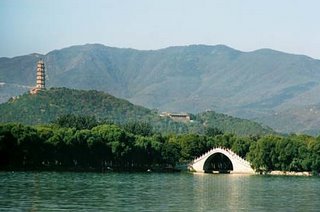Sunday, August 20
Friday, August 18
颐和园
The Summer Palace, or Yiheyuan, dates in its present form from Qing (Manchu) rule (1644-1911.) In the 1750s the emperor Qianlong commanded the creation of the lake and redesigned the temple atop Longevity Hill. Severely damaged during the punitive Anglo-French expedition of 1860, it was ordered to be restored after the Empress Dowager Cixi managed to embezzle some navy funds in the 1880s.


Surprise at the top of the hill: Bhaisajyagurubaiduryaprabhasa.
Bhaisajyaguru, aka Yao Shih Fwo in Chinese and Yakushi in Japanese, is one of the three foremost Buddhas of the Chinese pantheon. Also known as the Medicine Buddha or the Healing Master, this Buddha's efficacy is in preventing calamities and curing illness. The Sutra of the Buddha of Medicine (Bhaisajyaraja Sutra) was translated into Chinese first during the Chin dynasty, and then corrected and republished by Tripitaka Master Hsuan Tsang during the Tang. Hsuan Tsang's work is known as Bhaisajyaguru - Vaidurya - Prabhasa-Tathagata, i.e. Teacher of Medicines - Learning Glow - Who Here Arrived.


At Yiheyuan, Bhaisajyaguru is found in a triad with Sakyamuni Buddha and Amitabha Buddha, and his symbols are the medicine bowl and the pagoda.
Back to Beijing.



Surprise at the top of the hill: Bhaisajyagurubaiduryaprabhasa.
Bhaisajyaguru, aka Yao Shih Fwo in Chinese and Yakushi in Japanese, is one of the three foremost Buddhas of the Chinese pantheon. Also known as the Medicine Buddha or the Healing Master, this Buddha's efficacy is in preventing calamities and curing illness. The Sutra of the Buddha of Medicine (Bhaisajyaraja Sutra) was translated into Chinese first during the Chin dynasty, and then corrected and republished by Tripitaka Master Hsuan Tsang during the Tang. Hsuan Tsang's work is known as Bhaisajyaguru - Vaidurya - Prabhasa-Tathagata, i.e. Teacher of Medicines - Learning Glow - Who Here Arrived.


At Yiheyuan, Bhaisajyaguru is found in a triad with Sakyamuni Buddha and Amitabha Buddha, and his symbols are the medicine bowl and the pagoda.
Back to Beijing.

Thursday, August 17
Constitutions
Sir Robert Filmer invented liberalism in the process of attacking it. A staunch 17th-century English monarchist, Filmer took up cudgels against the stirrings of liberal democracy in post-restoration England, which he defined as the belief that "Mankind is naturally endowed and born with freedom from all subjection, and at liberty to choose what form of government it please, and that the power which any one man hath over others was at first bestowed according to the discretion of the multitude." From this position, a "vast engine of popular sedition" could be imagined up, leading even to the horrific view that rulers might be "subject to the censures and deprivations of their subjects".
Filmer had every right to be worried about the longevity of the monarchist view that some sons of heaven are divinely mandated to rule over the rest. His book was published in 1680 (though written 2 generations ago, in 1631), and within the short span of a hundred years or so people at the fringes of his beloved Patriarcha were talking about all men being created equal, that they had been endowed with certain inalienable rights, that among them are life, liberty and the pursuit of happiness, that to secure these rights governments are instituted among men, deriving their just powers from the consent of the governed, and, finally, that whenever any form of government becomes destructive of these ends, it is the right of the people to abolish it.
The idea of there being a limit to the power of those who govern is now a popular one. There are certain countries on the fringes of world society which still resist the concept of a written constitution -- Saudi Arabia, say, or the UK -- but in general the idea of a written document which says what your government cannot do is now widely regarded as a must-have, even it be for window-dressing. And more and more governments are actively putting these documents which show the limits of their power on the web, an example of which is the Constitution of the PRC to be found here.
Filmer had every right to be worried about the longevity of the monarchist view that some sons of heaven are divinely mandated to rule over the rest. His book was published in 1680 (though written 2 generations ago, in 1631), and within the short span of a hundred years or so people at the fringes of his beloved Patriarcha were talking about all men being created equal, that they had been endowed with certain inalienable rights, that among them are life, liberty and the pursuit of happiness, that to secure these rights governments are instituted among men, deriving their just powers from the consent of the governed, and, finally, that whenever any form of government becomes destructive of these ends, it is the right of the people to abolish it.
The idea of there being a limit to the power of those who govern is now a popular one. There are certain countries on the fringes of world society which still resist the concept of a written constitution -- Saudi Arabia, say, or the UK -- but in general the idea of a written document which says what your government cannot do is now widely regarded as a must-have, even it be for window-dressing. And more and more governments are actively putting these documents which show the limits of their power on the web, an example of which is the Constitution of the PRC to be found here.





















